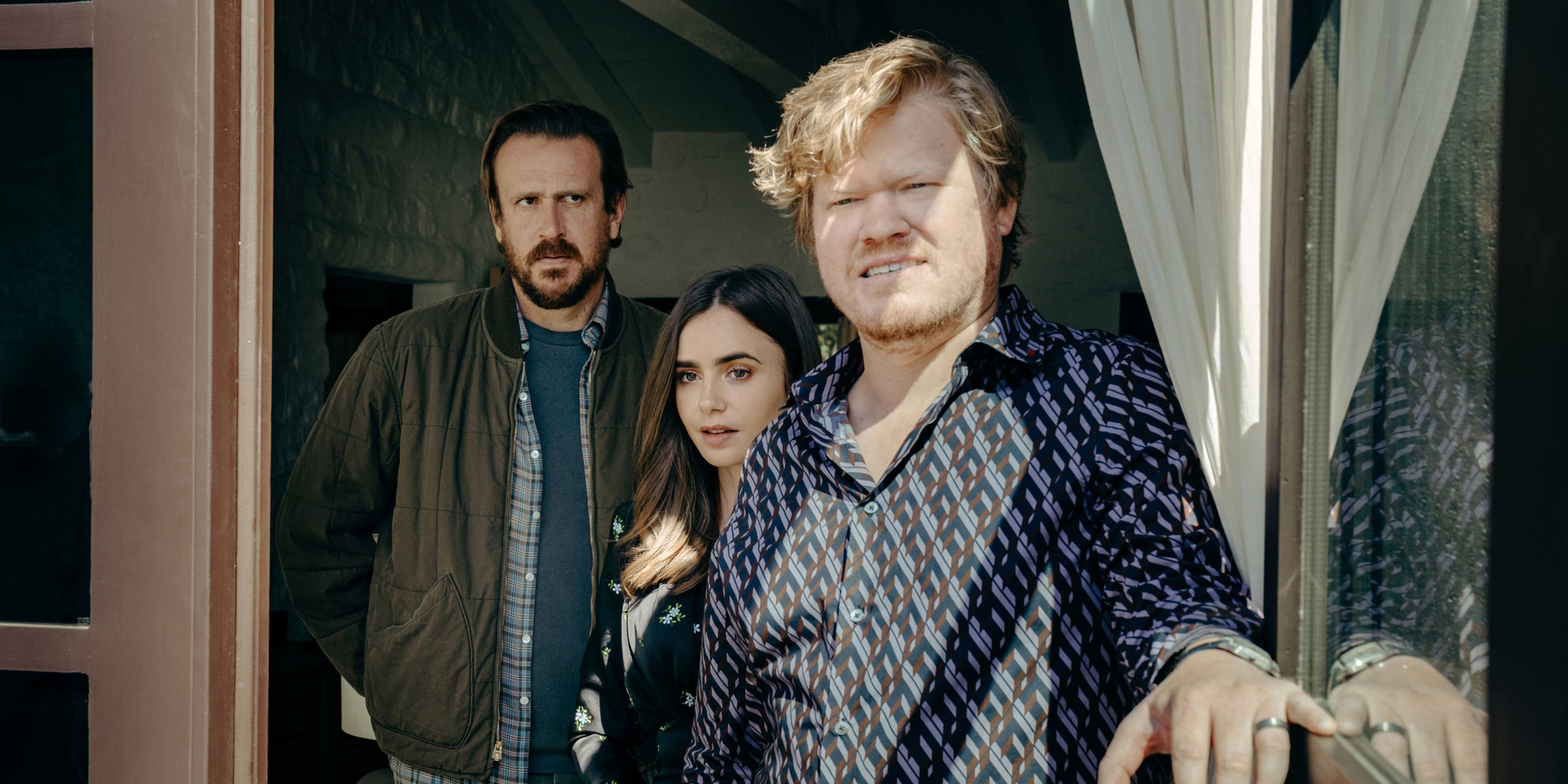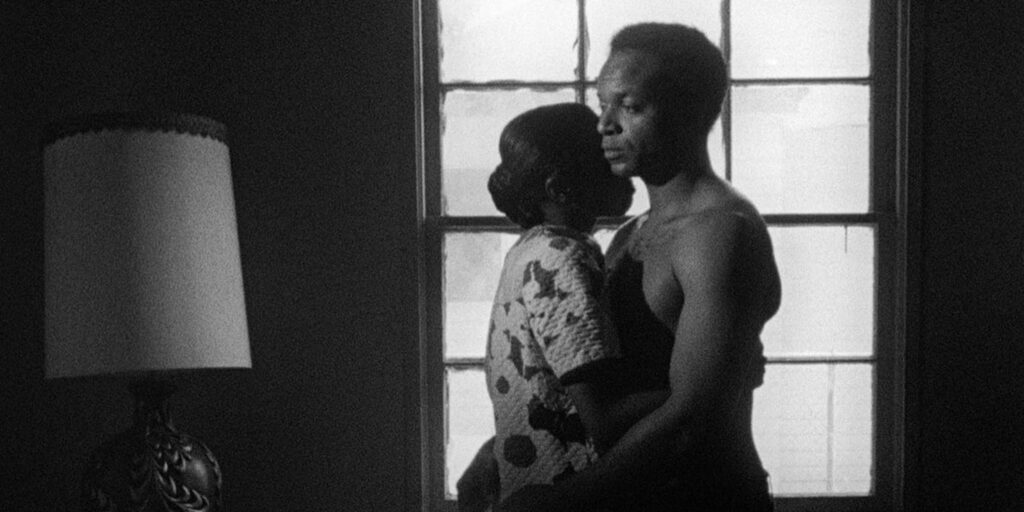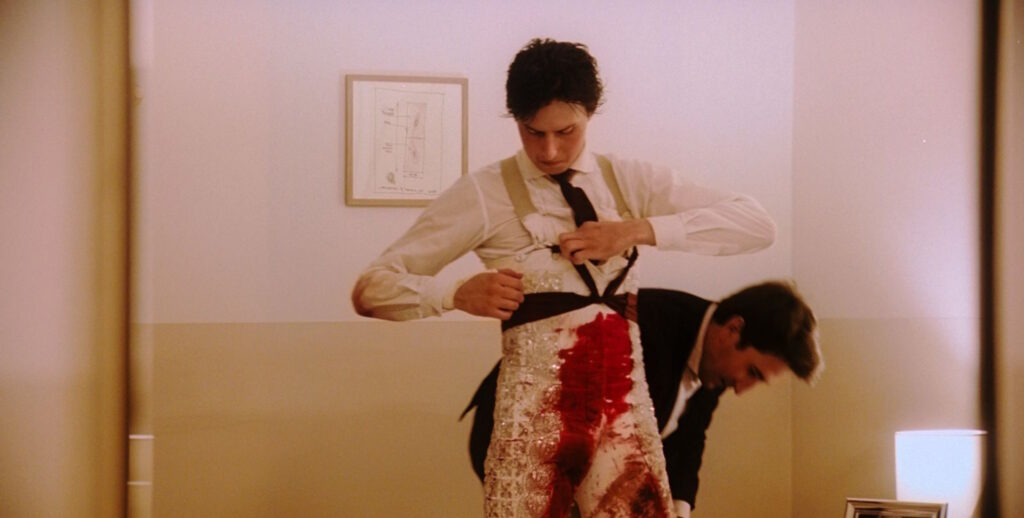[Originally published at Cinema St. Louis’ The Lens.]
Filmmaker Charlie McDowell’s Windfall opens with what seems like the perfect crime: break into a tech billionaire’s secluded vacation home when he’s not there, steal all the loose cash lying around in his various drawers and cabinets, leave the place just messy enough to make him feel unsettled, and get out months before anyone even notices the trespass. Of course, no crime ever goes quite as planned. After uncovering about $5,000, the thief (Jason Segel) is scrounging around for yet more cash when he sees that the CEO (Jesse Plemons) he’s robbing is headed up the driveway for an unplanned getaway with his lovely wife (Lily Collins). With no obvious way to escape and no possible chance of sweet-talking himself out of his situation, the thief’s choice has been made for him: Things are going to have to get difficult. The thief orders the CEO to hand over some additional cash and then walks out the door, no questions asked.
After spotting the hidden camera aimed at his getaway car, however, the thief revises his plan yet again. Things just went from bad to worse. He doubles back, panicking about the drastic change in circumstances and once again taking control of the CEO and his wife. The latter two then try to negotiate a reasonable amount of money to exchange for their freedom. Naturally, the CEO and his wife have a very different idea about the basic cost of living compared to the man holding them captive. $150,000? $300,000? $3 million? It must be low enough to not raise any alarms, but high enough to give the robber a fair shot at a new life. Then there’s the weight of the bills to consider. Once they eventually settle on a fair and practical number, all that’s left is to wait until the CEO’s assistant delivers the cash the following afternoon.
Windfall’s setup — which takes up only a small portion of the film’s tight 90 minutes — thereby gives way to the film’s true objective: trapping the bourgeoisie and the proletariat in a box, shaking it vigorously, and watching what happens next. As the trio trudges through the next 24 hours, they engage in heated debates over money, power, big tech, charity, inequality, relationships, and every other aspect of daily life that differs for the ultra-rich and the working class. Four different writers are credited: director Charlie McDowell; star Jason Segel; McDowell’s regular co-writer, Justin Lader; and prolific ’90s screenwriter Andrew Kevin Walker. Yet the film doesn’t feel like some highly polished product that’s gone through multiple rewrites. In fact, it’s quite the opposite: chatty, loose, raw. This is not a critique — it’s the ideal tone for this kind of claustrophobic crime drama.
Windfall is clearly a product of the pandemic: three talented actors and a director (who happens to be married to his lead actress) decamp to a nice house in the desert and shoot a film on what was surely a shoestring budget. It recalls Malcolm & Marie (2021) in this way, at least at the most reductive level: “Some people have a series of deep, increasingly hostile conversations in a picturesque abode over the course of a single night” could accurately describe either film. However, what makes Windfall the superior iteration of this framework is the actual subject matter of those conversations. Instead of awkwardly trying to make some profound point about 21st-century filmmaking or ostentatiously hemming and hawing about critics being too hard on filmmakers, Windfall dares to take on much heavier topics. For the most part, it succeeds.
Beyond the strength of its setup and its screenplay, McDowell’s film benefits from casting a close-knit group of frequent collaborators. Apart from being married to Collins, the director worked with Segel and Plemons on his sophomore film, The Discovery (2017), and even showed up to direct an episode of Segel’s short-lived television show Dispatches from Elsewhere (2020). This camaraderie between Windfall’s actors and director is palpable, as everyone seems to be having some fun playing around with their roles. Plemons — who has been getting a lot of awards attention for his part in The Power of the Dog (2021) — gets to cut loose as an arrogant, sociopathic Jeff Bezos-Elon Musk-Mark Zuckerberg amalgam, and Segel — often typecast as a hapless, endearing goof — has the opportunity to play a much more intense role than usual. Even Collins turns in a surprisingly engaging performance in a role that could have easily come off as two-dimensional in clumsier hands.
Although Windfall might not be inducted into the home-invasion-thriller hall of fame anytime soon, it’s also not really aiming for such accolades. In other words, it’s here for a good time, not a long time. Shamelessly indebted to such Alfred Hitchcock classics as Rope (1948) and Dial M for Murder (1954), complete with an Old Hollywood-style score that’s heavy on the brass and the woodwinds, McDowell”s feature owes more to film noir than, say, Straw Dogs (1971) or Funny Games (1997). Short but not too rushed, substantial but not too ponderous, and angry but not too aggressive, Windfall effectively squeezes every last drop out of its conceit without overstaying its welcome or crossing any controversial lines in the sand. Perhaps a bolder, more unhinged version of this film could have made a stronger statement about who holds the real wealth in America and what should be done to change that, but as it stands, Windfall is perfectly content being one of the better pandemic-born hangout films of the last couple of years.
Windfall will be available to stream on Netflix on Friday, Mar. 18.




